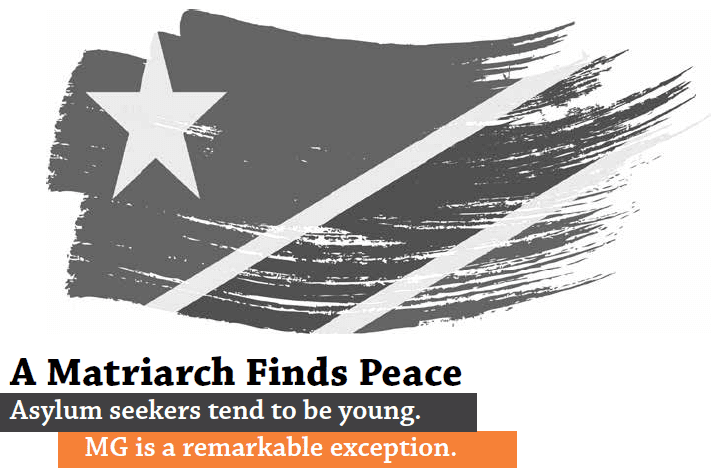ILAP features pro bono work of attorney Alicia Curtis
Written by Alicia F. Curtis
Note: If you have an asylum or family immigration case you would like reviewed, please contact The Immigrant Legal Advocacy Project (ILAP) to start. Any case Berman & Simmons works on comes through ILAP.
The Immigrant Legal Advocacy Project (ILAP), Maine’s only statewide provider of free and low-cost legal assistance to immigrants and refugees, honored Berman & Simmons and attorney Alicia Curtis for pro bono work on behalf of Maine’s immigrants and refugees.
Attorney Curtis recently represented a woman from the Democratic Republic of the Congo who had raised her grandchildren as her own, until the family was separated by war in 2004. After searching for six years the family found each other again, yet it wasn’t until 2015 that the grandmother was able to make her way to the United States. Ms. Curtis represented the grandmother through the asylum process, overcoming challenges like a lack of documentation and the backlog of asylum applications. Ms. Curtis ultimately won her client asylum and was able to reunite the family here in Maine.
Read the full story “A Matriarch Finds Peace” featured in ILAP’s The Beacon newsletter below.
Asylum seekers tend to be young. MG (her name is withheld for her privacy) is a remarkable exception.
No one knows MG’s age; her family guesses that she’s about 90. There are no birth records where she’s from, a village of subsistence farmers in the mountains of the Democratic Republic of the Congo, where her community endured decades of attacks and discrimination. MG brought up five of her own children amid this violence; after her daughter-in-law died, she raised seven grandchildren as well.
MG and her family were separated in 2004 while fleeing an attack. She made her way to a refugee camp in Rwanda; they wound up in the Gatumba camp in Burundi.
On the night of August 13, 2004, armed men massacred 166 people at the Gatumba camp. MG’s grandson and his family survived. When a horrified international community offered Gatumba survivors refugee status, the family relocated to the United States.
MG remained in Rwanda, unaware of her family members’ whereabouts, searching for them while fearing that they had been killed in the massacre. Nearing or in her 80s, she became a mother figure for the third time, adopting and raising seven orphaned children from her community in the Congo.
The grandson, meanwhile, repeatedly sent his cousin to the area to search for MG. The cousin scoured Rwanda and Burundi, traveling from refugee camp to refugee camp by train, bus and foot. He found her in 2010. He called the grandson on his cell phone and handed it to MG, and she heard his voice for the first time in six years. “I jumped for joy!” she says.
MG finally had a chance to reunite with her family in 2015, when she received a tourist visa to attend her grandson’s college graduation. The trip involved more than 24 hours of travel. Afraid to ask for anything—she speaks only her native language and a bit of Swahili—MG went the entire trip without eating.
She arrived in the United States, and for the first time in decades experienced life in a country at peace. She told her grandson that she wanted to try to stay. After an intake screening at ILAP, her case was put on a list that ILAP sends regularly to pro bono attorneys. One was Alicia Curtis, ILAP’s Pro Bono Attorney of the Year in 2017. “Her story resonated with me,” says Curtis. “It’s extremely unusual for someone to seek asylum at her age. And having grown up on a little farm in rural Maine, I felt a certain kinship given her very traditional background.”
Curtis met repeatedly with MG, earning her trust, learning her story and sifting through it for the details that were legally relevant to the asylum request. The process was difficult for MG. “It made me sad to remember everything that happened to me and my family,” she says.
The application process tested Curtis, too. “I had to take a crash course in the history of the Congo so I could put MG’s experience into context,” she says. “And ordinarily we try to support a claim with as much documentation as possible—work records, hospital records and so on—but MG came from an oral culture where no aspects of her life were recorded.” Instead, Curtis gathered extremely detailed witness statements from MG’s grandson and a son living in Texas. She submitted the application to U.S. Citizenship and Immigration Services (USCIS) in March 2016.
Then they waited for an interview with an asylum officer. At the time there was a four-year backlog. “It felt like a very long time,” MG says. “I grew discouraged.”
Curtis engineered a breakthrough, getting MG on a list of applicants to be called in the event of a cancellation. The call came on Friday, September 15, 2017; Curtis was given 20 minutes to say whether she, MG and an interpreter could be in Boston at 8:00 a.m. the following Monday. After a mad scramble, she was able to say yes. “She was nervous, but she was very excited that she could finally tell her story to a decision-maker,” says Curtis. “And she did a spectacular job.”
After another six-month wait, MG was called in for a follow-up interview. Four weeks later she received asylum.
MG now lives with her grandson’s family. She relishes watching her three great-grandchildren grow, but she worries about the members of her community back home and in refugee camps. She’s looking forward to starting a new application process—this time to try to bring the children she adopted in Rwanda to live with her, in peace, in the United States.